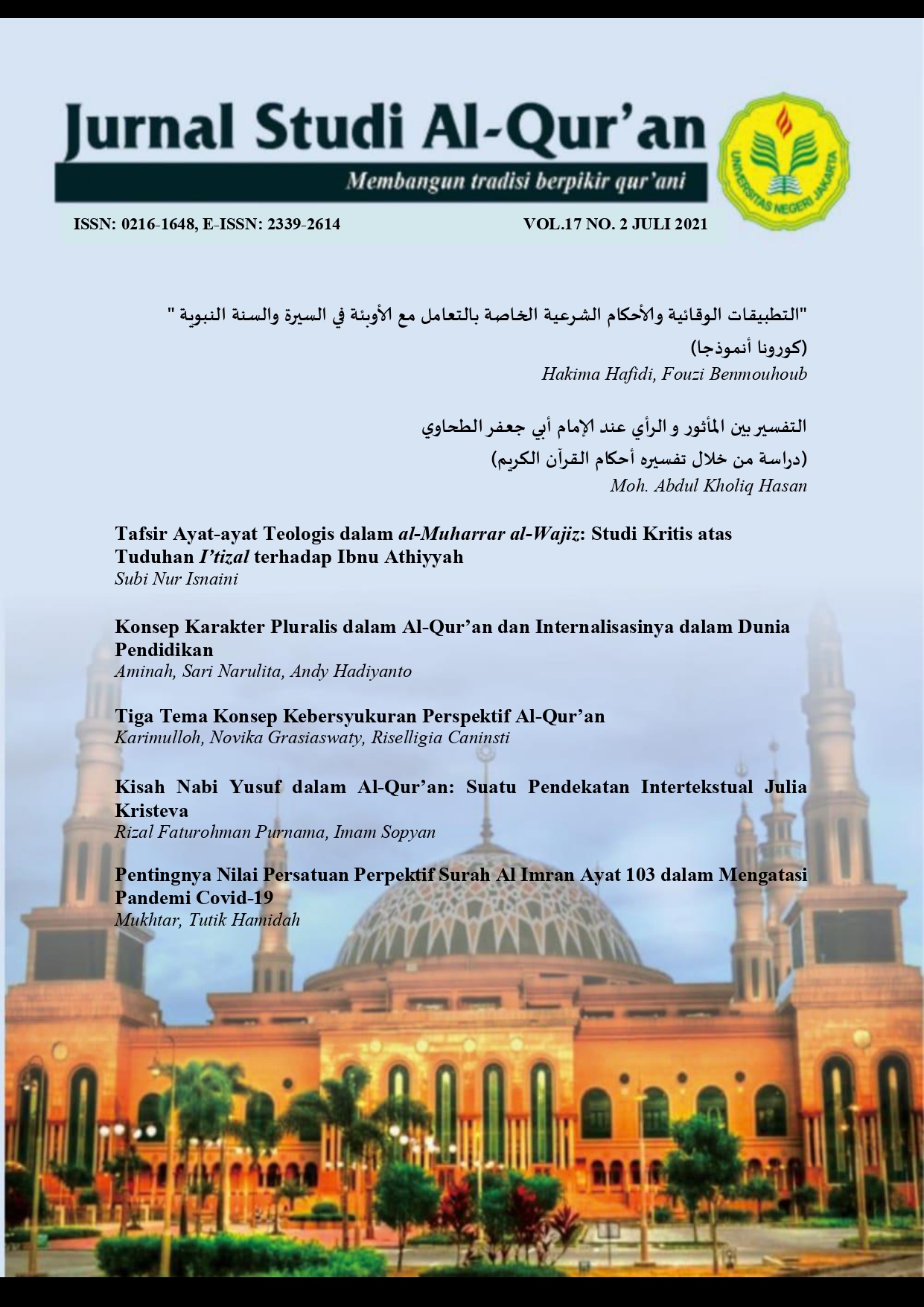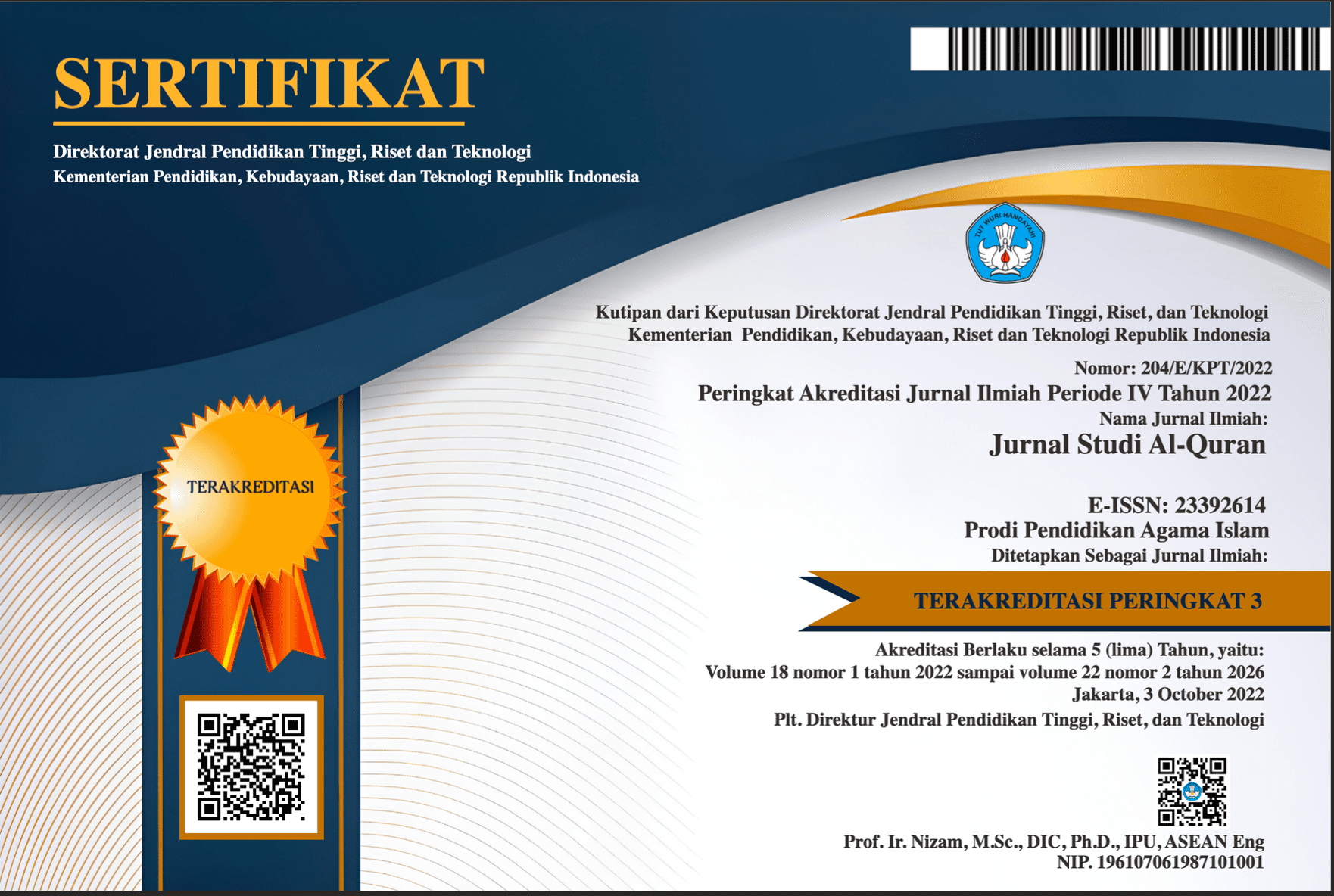The Story of Prophet Yusuf in the Qur'an and the Bible
Suatu Pendekatan Intertekstual Julia Kristeva
DOI:
https://doi.org/10.21009/JSQ.017.2.06Keywords:
Prophet Yusuf, al-Qur'an, IntertextualAbstract
This article discusses the story of The Prophet Yusuf in the Qur'an. As the story is contained in the Qur'an and the Bible, from both books the story of Yusuf tells about four things. First, the story of Yusuf dreaming, Secondly, the tragedy of Yusuf being banished. Third, the story of Yusuf and Imara'ah Al-'aziz. Fourth, the story of Yusuf’s imprisonment. Therefore, this story becomes important to be examined more deeply aimed at finding the differences of the two scriptures about the story of yusuf. Therefore, the approach used is intertekstual initiated by Julia Kristeva who seeks to compare the two. Thus, this study found many differences, in terms of dominant in each fragment. The most basic difference between the two is in terms of the theme to be raised, the song of Joseph in the Qur'an themed on the teachings of Tawhid, while in the Bible themed on power
References
Ali, Faila Sufatun Nisak. “Penafsiran QS. Al-Fatihah K.H Mishbah Mustafa : Studi Intertekstualitas Dalam Kitab Al-Iklil Fi Ma’ani At-Tanzil.” Al Iman: Jurnal Keislaman Dan Kemasyarakatan 3, no. 2 (9 September 2019): 150–79.
Ali Imron, S. S. “Kisah Nabi Yusuf a.s. Dalam Al-Qur’an (Kajian Semiotika).” Masters, UIN Sunan Kalijaga, 2010. http://digilib.uin-suka.ac.id/6968/.
Al-Makin. Keragaman dan perbedaan: budaya dan agama dalam lintas sejarah manusia, 2016.
Dianto, Icol. “Paradigma Perubahan Sosial Perspektif Change Agent Dalam Al-Quran (Analisis Tematik Kisah Nabi Yusuf As).” Jurnal Sosiologi Reflektif 14, no. 1 (8 November 2019): 59–80. https://doi.org/10.14421/jsr.v14i1.1476.
El Shirazy, Habiburrahman. “Berdakwah Dengan Puisi (Kajian Intertekstual Puisi-Puisi Religius Taufiq Ismail),” t.t.
Fina, Lien Iffah Naf’atu. “Pre Canonical Reading of the Qur’an: Studi atas Metode Angelika Neuwirth dalam Analisis Teks Alquran Berbasis Surat dan Intertekstualitas.” Yogyakarta: UIN Sunan Kalijaga, 2011.
Hamersma, Harry. Tokoh-Tokoh Filsafat Barat Modern. Jakarta: Gramedia Verl., 1992.
Hanif, Muhammad. “Kisah Nabi Yusuf Dalam Al-Qur’an; Kajian Stilistika Alquran Surah Yusuf.” AL-AF’IDAH: Jurnal Pendidikan Bahasa Arab Dan Pengajarannya 2, no. 2 (1 September 2018): 1–27.
Harun, Amrullah. “Kisah Yusuf/Joseph Dalam Al-Qur’an Dan Alkitab” 7, no. 1 (13 Agustus 2019). http://journal.uin-alauddin.ac.id/index.php/tafsere/article/view/9939.
Khikmatiar, Azkiya. “Kisah Nabi Nuh Dalam Al-Qur’an (Pendekatan Intertekstual Julia Kristeva).” At-Tibyan: Jurnal Ilmu Alqur’an Dan Tafsir 4, no. 2 (16 Desember 2019): 209–26. https://doi.org/10.32505/tibyan.v4i2.1144.
Kristeva, Julia. Desire in Language: A Semiotic Approach to Literature and Art. S.l.: Columbia Univ. Press, 2006.
———. Le Texte Du Roman: Approche Sémiologique d’une Discursive Transformationelle. The Hague, Paris: Mouton, 1970.
———. Polylogue. Paris: Seuil, 1977.
———. Powers of horror: an essay of abjection. New York ; Chichester: Columbia University Press, 1984.
———. Sēmeiotikē: recherches pour une sémanalyse, 2017.
———. Strangers to Ourselves. New York: Harvester Wheatsheaf, 1996.
Kristeva, Julia, dan Leon Samuel Roudiez. Black Sun: Depression and Melancholia. New York: Oxford : Columbia University Press, 2006.
Kristeva, Julia, Leon Samuel Roudiez, dan Margaret Waller. Revolution in Poetic Language. New York: Columbia University Press, 2006.
MA, Dr Munzir Hitami. Pengantar Studi Al-Qur’an: Teori dan Pendekatan. Lkis Pelangi Aksara, t.t.
Mardalis. Metode penelitian: suatu pendekatan proposal. Jakarta: Bumi Aksara, 1995.
Mukti, Beta Pujangga. “Strategi Ketahanan Pangan Nabi Yusuf: Studi Analisis tentang Sistem Ketahanan Pangan Nabi Yusuf dalam Al-Quran Surat Yusuf Ayat: 46-49.” Tarjih: Jurnal Tarjih dan Pengembangan Pemikiran Islam 16, no. 1 (22 Juni 2019): 35–47.
Neuwirth, Angelika, Michael Marx, dan Nicolai Sinai. Qur’an in Context: Historical and Literary Investigations into the Qur’anic Milieu. Leiden: Brill, 2009.
Nurdin, Ali. “Etika Pergaulan Remaja Dalam Kisah Nabi Yusus AS (Telaah Tafsir Tarbawi dalam Surat Yusuf Ayat 23-24).” Andragogi: Jurnal Pendidikan Islam dan Manajemen Pendidikan Islam 1, no. 3 (20 Desember 2019): 490–510. https://doi.org/10.36671/andragogi.v1i3.69.
Pratama, Oka Putra. “Kesantunan Berbahasa:Prosa Bografi Kisah Nabi Yusuf Dalam Al-Qur’an,” Oktober 2017. http://repository.uinjkt.ac.id/dspace/handle/123456789/41634.
———. “Tindak Tutur Santun Dalam Kisah Nabi Yusuf.” Arabiyat : Jurnal Pendidikan Bahasa Arab dan Kebahasaaraban 4, no. 2 (28 Desember 2017): 227–54. https://doi.org/10.15408/a.v4i2.6352.
Rahmah, Mariyatul Norhidayati. “Model Komunikasi Interpersonal Dalam Kisah Nabi Yusuf As.” Al-Hiwar : Jurnal Ilmu Dan Teknik Dakwah 4, no. 6 (21 April 2017). https://doi.org/10.18592/al-hiwar.v4i6.1212.
Robikah, Siti. “Tafsir Surah Yusuf Dalam Alquran Dengan Pendekatan Sastra Mustansir Mir.” Al-Bayan: Jurnal Studi Ilmu Al- Qur’an dan Tafsir 4, no. 1 (30 Juni 2019). https://doi.org/10.15575/al-bayan.v4i1.4208.
Rusmana, Dadan. Filsafat Semiotika, Paradigma, Teori, dan Metode Interpretasi Tanda dari Semiotika Struktural Hingga Dekontruksi Praktis. Bandung: Pustaka Setia, 2014.
Sodiqin, Ali, dan Abdul Qodir Shaleh. Antropologi al-quran: model dialektika wahyu & budaya. Yogyakarta: Ar-ruzz Media, 2008.
Stott, John R. W, dan Paul Hidayat. Memahami isi Alkitab, 1984.
Sulaikho’, Siti. “Komparansi Kisah Yusuf Dan Zulaikha Antara Perjanjian Lama Dan Al-Qur’an.” Al-Lahjah 2, no. 2 (2018): 72–86.
Taufiq, Wildan. Semiotika Untuk Kajian Sastra dan AlQuran. Bandung: Yrama Widya, 2016.
Yusuff, Mohd Sholeh bin Sheh. “Bacaan Intertekstual terhadap Sumber Al-Isra’iliyyat dalam Tafsir Nur al-Ihsan.” INSANCITA 3, no. 1 (2 Maret 2018). https://doi.org/10.2121/incita-jisisea.v3i1.965.
Zulaikhoh, Siti. “Kisah Nabi Yusuf As. (Ibrah Dan Implementasi Konseptual Dalam Pendidikan).” Other, IAIN Salatiga, 2015. http://e-repository.perpus.iainsalatiga.ac.id/.
Downloads
Published
How to Cite
Issue
Section
License
Authors who publish with this Journal agree to the following terms:
- Author retain copyright and grant the journal right of first publication with the work simultaneously licensed under a creative commons attribution licensethat allow others to share the work within an acknowledgement of the work’s authorship and initial publication of this journal.
- Authors are able to enter into separate, additional contractual arrangementfor the non-exclusive distribution of the journal’s published version of the work (e.g. acknowledgement of its initial publication in this journal).
- Authors are permitted and encouraged to post their work online(e.g. in institutional repositories or on their websites) prior to and during the submission process, as it can lead to productive exchanges, as well as earlier and greater citation of published works.
Users/public use of this website will be licensed to CC BY










